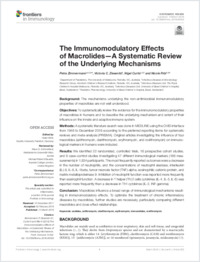The immunomodulatory effects of macrolides - a systematic review of the underlying mechanisms
- Zimmermann, Petra Department of Paediatrics, The University of Melbourne, Parkville, VIC, Australia - Infectious Diseases & Microbiology Research Group, Murdoch Children’s Research Institute, Parkville, VIC, Australia - Infectious Diseases Unit, The Royal Children’s Hospital Melbourne, Parkville, VIC, Australia - Infectious Diseases Unit, University of Basel Children’s Hospital, Basel, Switzerland - Department of Medicine, University of Fribourg, Switzerland
- Ziesenitz, Victoria C. Paediatric Pharmacology, University of Basel Children’s Hospital, Basel, Switzerland
- Curtis, Nigel Department of Paediatrics, The University of Melbourne, Parkville, VIC, Australia - Infectious Diseases & Microbiology Research Group, Murdoch Children’s Research Institute, Parkville, VIC, Australia - Infectious Diseases Unit, The Royal Children’s Hospital Melbourne, Parkville, VIC, Australia
- Ritz, Nicole Infectious Diseases & Microbiology Research Group, Murdoch Children’s Research Institute, Parkville, VIC, Australia - Infectious Diseases Unit, University of Basel Children’s Hospital, Basel, Switzerland - Paediatric Pharmacology, University of Basel Children’s Hospital, Basel, Switzerland
-
2018
Published in:
- Frontiers in Immunology. - 2018, vol. 9, p. 302
English
The mechanisms underlying the non-antimicrobial immunomodulatory properties of macrolides are not well understood.Objectives: To systematically review the evidence for the immunomodulatory properties of macrolides in humans and to describe the underlying mechanism and extent of their influence on the innate and adaptive immune system.Methods: A systematic literature search was done in MEDLINE using the OVID interface from 1946 to December 2016 according to the preferred reporting items for systematic reviews and meta-analysis (PRISMA). Original articles investigating the influence of four macrolides (azithromycin, clarithromycin, erythromycin, and roxithromycin) on immunological markers in humans were included.Results: We identified 22 randomized, controlled trials, 16 prospective cohort studies, and 8 case–control studies investigating 47 different immunological markers (186 measurements) in 1,834 participants. The most frequently reported outcomes were a decrease in the number of neutrophils, and the concentrations of neutrophil elastase, interleukin (IL)-8, IL-6, IL-1beta, tumor necrosis factor (TNF)-alpha, eosinophilic cationic protein, and matrix metalloproteinase 9. Inhibition of neutrophil function was reported more frequently than eosinophil function. A decrease in T helper (Th) 2 cells cytokines (IL-4, IL-5, IL-6) was reported more frequently than a decrease in Th1 cytokines (IL-2, INF-gamma).Conclusion: Macrolides influence a broad range of immunological mechanisms resulting in immunomodulatory effects. To optimize the treatment of chronic inflammatory diseases by macrolides, further studies are necessary, particularly comparing different macrolides and dose effect relationships.
- Faculty
- Faculté des sciences et de médecine
- Department
- Master en médecine
- Language
-
- English
- Classification
- Biological sciences
- License
- License undefined
- Identifiers
-
- RERO DOC 328059
- DOI 10.3389/fimmu.2018.00302
- Persistent URL
- https://folia.unifr.ch/unifr/documents/308428
Statistics
Document views: 106
File downloads:
- zim_iem.pdf: 267
